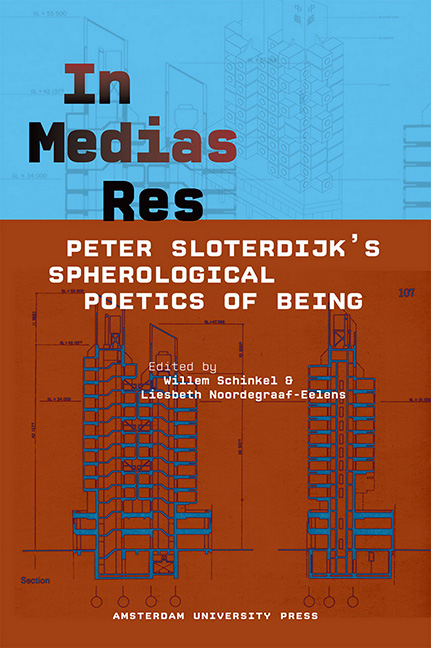Book contents
- Frontmatter
- Contents
- 1 Peter Sloterdijk’s Spherological Acrobatics: An Exercise in Introduction
- 2 Foamy Business: On the Organizational Politics of Atmospheres
- 3 “Transgenous Philosophy”: Post-humanism, Anthropotechnics and the Poetics of Natal Difference
- 4 Disinhibition, Subjectivity and Pride. Or: Guess Who Is Looking?: Peter Sloterdijk’s reconstruction of ‘thymotic’ qualities, psychoanalysis and the question of spectatorship
- 5 Sloterdijk and the Question of an Aesthetic
- 6 Uneasy Places. Monotheism, Christianity, and the Dynamic of the Unlikely in Sloterdijk’s Work – Context and Debate
- 7 The Attention Regime: On Mass Media and the Information Society
- 8 In the Beginning was the Accident: The Crystal Palace as a Cultural Catastrophe and the Emergence of the Cosmic Misfit: A critical approach to Peter Sloterdijk’s Weltinnenraum des Kapitals vs. Fyodor M. Dostoevsky’s Notes from the underground
- 9 A Cautious Prometheus? A Few Steps Toward a Philosophy of Design with Special Attention to Peter Sloterdijk
- 10 Sloterdijk and the Question of Action
- 11 The Space of Global Capitalism and its Imaginary Imperialism: An Interview with Peter Sloterdijk
- Contributors
- Index
6 - Uneasy Places. Monotheism, Christianity, and the Dynamic of the Unlikely in Sloterdijk’s Work – Context and Debate
- Frontmatter
- Contents
- 1 Peter Sloterdijk’s Spherological Acrobatics: An Exercise in Introduction
- 2 Foamy Business: On the Organizational Politics of Atmospheres
- 3 “Transgenous Philosophy”: Post-humanism, Anthropotechnics and the Poetics of Natal Difference
- 4 Disinhibition, Subjectivity and Pride. Or: Guess Who Is Looking?: Peter Sloterdijk’s reconstruction of ‘thymotic’ qualities, psychoanalysis and the question of spectatorship
- 5 Sloterdijk and the Question of an Aesthetic
- 6 Uneasy Places. Monotheism, Christianity, and the Dynamic of the Unlikely in Sloterdijk’s Work – Context and Debate
- 7 The Attention Regime: On Mass Media and the Information Society
- 8 In the Beginning was the Accident: The Crystal Palace as a Cultural Catastrophe and the Emergence of the Cosmic Misfit: A critical approach to Peter Sloterdijk’s Weltinnenraum des Kapitals vs. Fyodor M. Dostoevsky’s Notes from the underground
- 9 A Cautious Prometheus? A Few Steps Toward a Philosophy of Design with Special Attention to Peter Sloterdijk
- 10 Sloterdijk and the Question of Action
- 11 The Space of Global Capitalism and its Imaginary Imperialism: An Interview with Peter Sloterdijk
- Contributors
- Index
Summary
Es ist das beste an der Religion, dass sie Ketzer hervorruft.
Ernst BlochMonotheism revisited in contemporary philosophy
A spectre is visiting the western world – the spectre of monotheism. It is fashionable nowadays, when referring to this spectre, to speak of a ‘return of religion’ in our times, but in fact, what is returning, what is revisiting the world, is not religion in general, but its threefold western varieties: Judaism, Christianity and Islam. The spectre is visiting us, and we have to ‘revisit’ it – in philosophy and science, in politics, in our daily existence. However, what does ‘revisiting’ mean? Does it simply address the return of something that had temporarily disappeared (or at least one hoped so)? Or does it have to face the possibility that the spectre had never been away? That the western world, that ‘we’ are in a way the spectre, so that one has to conclude that, when we take on the task of a revisiting of monotheism, we are actually revisiting ourselves?
It is this second possibility that forms the emphatic focal point of a new development within contemporary philosophy, in which the works of Peter Sloterdijk take an active part. One need not be surprized, therefore, that the opening phrase of this chapter is a slight, specifying variation of the way Sloterdijk opens his recent book Du musst dein Leben ändern (You Will Have to Change your Life, 2009): “A spectre is haunting the western world – the spectre of religion.” Needless to say, Sloterdijk in turn varies the famous opening statement of Marx's and Engels's Communist Manifesto. However, whereas the latter alludes to a completely new, revolutionary event in Europe, the inevitable rise of communism through and within the political economy of capitalism, Sloterdijk aims at exactly the opposite: the spectre of religion is an old, all too old spectre, that has formed andmade the complex configuration we call the ‘West’, or ‘Europe’. Nothing new, nothing even returning …
It is not a case of some element [Grösse] that would now have returned after having disappeared, but a shift of accent in a continuum that was never broken.
Information
- Type
- Chapter
- Information
- In Medias ResPeter Sloterdijk's Spherological Poetics of Being, pp. 99 - 114Publisher: Amsterdam University PressPrint publication year: 2012
